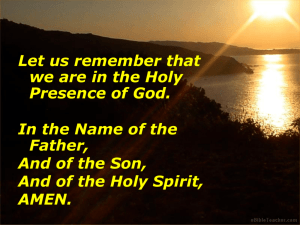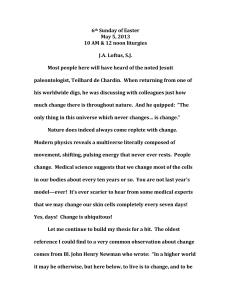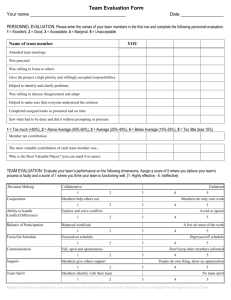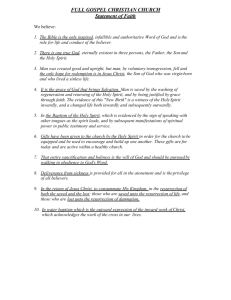Sixth Sunday in Easter May 9, 2010 10 AM Liturgy
advertisement
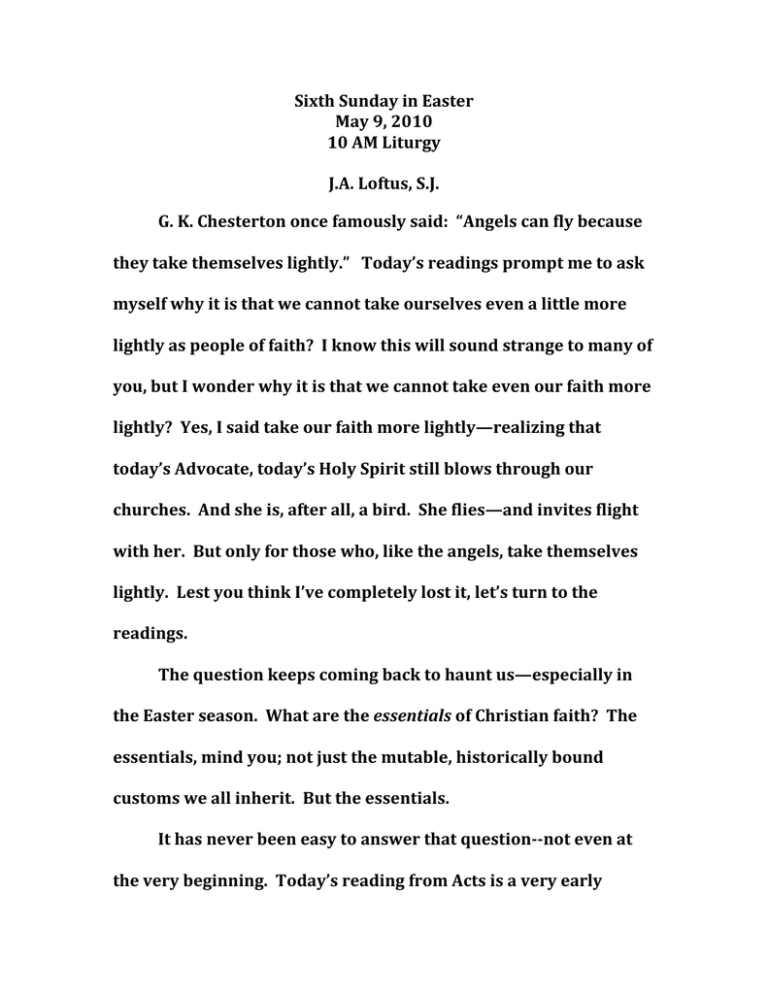
Sixth Sunday in Easter May 9, 2010 10 AM Liturgy J.A. Loftus, S.J. G. K. Chesterton once famously said: “Angels can fly because they take themselves lightly.” Today’s readings prompt me to ask myself why it is that we cannot take ourselves even a little more lightly as people of faith? I know this will sound strange to many of you, but I wonder why it is that we cannot take even our faith more lightly? Yes, I said take our faith more lightly—realizing that today’s Advocate, today’s Holy Spirit still blows through our churches. And she is, after all, a bird. She flies—and invites flight with her. But only for those who, like the angels, take themselves lightly. Lest you think I’ve completely lost it, let’s turn to the readings. The question keeps coming back to haunt us—especially in the Easter season. What are the essentials of Christian faith? The essentials, mind you; not just the mutable, historically bound customs we all inherit. But the essentials. It has never been easy to answer that question­­not even at the very beginning. Today’s reading from Acts is a very early illustration of the problem. It’s been said by many that organized religions thrive on dividing people into the “true” believers and the “false” ones. And “true” believers have often resorted to violence to make their point. In recent history the so­called militant atheists writing about the dangers of all religion have again observed this. But one does not have to be an atheist to be appalled at just how true it has become. In a recent book, retired Anglican bishop John Shelby Spong, writes: “Organized religion always divides the world into warring camps. It separates the followers of ‘true religion’ from the followers of that which it judges to be false religion. It separates true believers from heretics, the clean from the unclean, the saved from the unsaved, the baptized from the unbaptized, and the circumcised from the uncircumcised” (Eternal Life: A New Vision, p. 163). If you think about it for a minute, it does kind of describe the history of Christianity at least. And you can add your own contemporary dualities to the list. (Think of cafeteria Catholics versus the staunchly “orthodox.”) What is it, with at least so many of us, that cannot allow for difference, cannot allow for 2 alternatives, and cannot allow for breath? Speaking of breath, what is it about so many of us that cannot allow the Spirit, the Holy Spirit, to blow where she wills? Sometimes we think we can allow the Spirit of God to freshen our gatherings. But very quickly that too can turn into “we like the Spirit and you only like the institutions.” Ha­ha! Division has been with us, I’m afraid since the time of Adam and Eve. We do thrive on it most days. And it’s by no means unique to churches; just look at our nation today. But that’s another homily. Today’s first reading from the Acts of the Apostles is a truly amazing story. It is foundational for our church. It describes the very first “ecumenical” council, known now as the Council of Jerusalem. The crisis facing them is very real. Is the observance of the Mosaic Law required for salvation in the new dispensation? They are all still Jews gathered in Jerusalem. For Jews the answer can only be a profound yes. Without the traditions, centuries old and revered, and without the teaching of the rabbis, there can be no religion, no faith. All this is obvious. Tradition and scripture must always be honored. 3 But here comes that troublesome Spirit again. Peter has already been prompted by the Spirit to baptize Cornelius’ whole family without any commitment that they will observe Mosaic Law. Oops! And here again, in the face of so many converts to the new group who are not Jews, the Spirit seems to speak in a strangely new way. Fr. Tom Rosica, CSB, a Canadian scripture scholar, says this about today’s reading: “Peter and Paul show a remarkable respect for the manifestation of the Holy Spirit in the lives of ordinary people and situations. Even when the Spirit seemed to shatter the sacred traditions that existed for centuries, Peter and Paul knew that the Holy Spirit was not bound by tradition and history (Zenit May 4, 2010). If the Holy Spirit is not bound by tradition and history, why do we still feel so bound ourselves? And in so many arenas? Today’s translation has it: “It is the decision of the Holy Spirit and of us to impose no further burden on you….” I much prefer the NRSV rendering that says: “It seemed good to the Holy Spirit and to us….” It is a much more deliberative, reflective, and modest claim that “it seemed good to the Holy Spirit, and to us.” But the effect is 4 the same. Centuries of tradition and sacred “deposits” of faith are overturned—in one fell swoop. What was “essential” has just become quite relative, hasn’t it? Contrary to much of what I was taught growing up, God actually has a way of doing that a lot! There were lots of things I thought could not change; most have in fact already changed. I guess it just “seemed good to the Holy Spirit” throughout history—and to us— to stop imposing burdens that no longer made sense. (Please fill in your own “blanks” for whatever seems to have not made sense over time. And fill the blanks in for today’s church as well.) So what remains essential? It’s no longer even what the Council of Jerusalem suggested. The bad news is that fornication is still out. But I haven’t had to worry about strangled meat in quite a while, nor meat offered to idols in sacrifice. Those have changed too. What remains essential? Jesus does more than hint in the gospel. It is essential that we live in peace with each other: liberal and conservative, fundamentalist and libertarian, gay and straight, male and female, etc. It is essential to receive Christ’s peace, his enduring gift to us all, not just to some of us. It is essential to know and trust the 5 Advocate Jesus leaves behind in the church. She still blows where she will! And it is essential that we not let our hearts be troubled but trust. In Julian’s marvelous words: “All manner of things shall be well.” Something our contemporary church could try to hear these recent days especially. Maybe there are some things we take too seriously. Can we hear Jesus: “Do not let you hearts be troubled.” Beginning with the Council of Jerusalem right on down the centuries through the Second Vatican Council of 45 years ago, regardless of what some may suggest to the contrary, the real history of the church is summarized well by e.e. cummings: “to grow is to change; to grow often is to have changed much.” And remember Chesterton’s angels: they can only fly because they take themselves more lightly. Peace! 6
